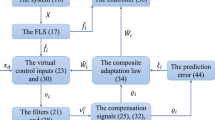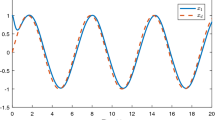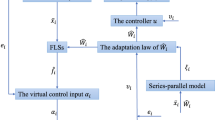Abstract
The paper devotes to investigate the tracking problem for a class of unknown fractional-order nonlinear systems suffering from actuator faults, and proposes an adaptive composite learning control approach by using approximation principle of fuzzy logic systems and backstepping layout. It is well known that the standard backstepping control has inherent computational complexity. Therefore, a type of fractional-order command filters are introduced to overcome such a shortcoming, that is, by means of the proposed command filters, the virtual input signals and their own fractional derivatives can be estimated properly as anticipated. To enable that more better performance is realized while one copes with the filtering error, an error-compensation mechanism is concerned. Besides, in the fuzzy composite learning, fuzzy logic system is exploited to approximate each of the unknown functions in the dynamic system. Meanwhile, the online historical data and instantaneous data are applied to induce the prediction errors, and the tracking error and the prediction errors are used to update the parameters of fuzzy logic systems. The stability analysis is established on the basis of fractional-order Lyapunov method, and the boundedness of all signals is guaranteed. Finally, the effectiveness of the proposed configuration is authenticated by numerical simulation.










Similar content being viewed by others
References
Bataghva, M., Hashemi, M.: Adaptive sliding mode synchronisation for fractional-order non-linear systems in the presence of time-varying actuator faults. IET Control Theory Appl. 12(3), 377–383 (2018)
Bensalem, Y., Abbassi, R., Jerbi, H.: Fuzzy logic based-active fault tolerant control of speed sensor failure for five-phase PMSM. J. Electr. Eng. Technol. 16, 287–299 (2021)
Chen, M., Ge, S.S., How, B.V.E.: Robust adaptive neural network control for a class of uncertain MIMO nonlinear systems with input nonlinearities. IEEE Trans. Neural Netw. 21(5), 796–812 (2010)
Cong, W., Min, W., Liu, T., Hill, D.J.: Learning from ISS-modular adaptive NN control of nonlinear strict-feedback systems. IEEE Trans. Neural Netw. Learn. Syst 23(10), 1539–1550 (2012)
Demirci, E., Ozalp, N.: A method for solving differential equations of fractional order. J. Comput. Appl. Math. 236(11), 2754–2762 (2012)
Gao, H., Song, Y., Wen, C.: Backstepping design of adaptive neural fault-tolerant control for MIMO nonlinear systems. IEEE Trans. Neural Netw. Learn. Syst. 28(11), 2605–2613 (2017)
Guo, K., Pan, Y., Zheng, D., Yu, H.: Composite learning control of robotic systems: a least squares modulated approach. Automatica 111, 108612 (2020)
Guo, Y., Qin, H., Xu, B., Han, Y., Fan, Q.Y., Zhang, P.: Composite learning adaptive sliding mode control for auv target tracking. Neurocomputing 351, 180–186 (2019)
Ha, S., Liu, H., Li, S., Liu, A.: Backstepping-based adaptive fuzzy synchronization control for a class of fractional-order chaotic systems with input saturation. Int. J. Fuzzy Syst. 21(5), 1571–1584 (2019)
Han, Z., Li, S., Liu, H.: Composite learning sliding mode synchronization of chaotic fractional-order neural networks. J. Adv. Res. 25, 87–96 (2020)
Izaguirre-Espinosa, C., Mu\({\tilde{n}}\)oz-Vazquez, A. J., Sanchez-Orta, A., Parra-Vega, V., Fantoni, I.: Fractional-order control for robust position/yaw tracking of quadrotors with experiments. IEEE Trans. Control Syst. Technol. 27(4), 1645–1650 (2019)
Jang, J.-S.R.: Anfis: adaptive-network-based fuzzy inference system. IEEE Trans. Syst. Man Cybern. 23(3), 665–685 (1993)
Kurdila, A.J., Narcowich, F.J., Ward, J.D.: Persistency of excitation in identification using radial basis function approximants. SIAM J. Control. Optim. 33(2), 625–642 (2006)
Li, C., Deng, W.: Remarks on fractional derivates. Appl. Math. Comput. 187(2), 777–784 (2007)
Li, Y., Chen, Y., Podlubny, I.: Mittag-Leffler stability of fractional order nonlinear dynamic systems. Automatica 45(8), 1965–1969 (2009)
Li, Y., Sun, K., Tong, S.: Observer-based adaptive fuzzy fault-tolerant optimal control for SISO nonlinear systems. IEEE Trans. Cybern. 49(2), 649–661 (2019)
Liu, H., Li, S., Li, G., Wang, H.: Adaptive controller design for a class of uncertain fractional-order nonlinear systems: an adaptive fuzzy approach. Int. J. Fuzzy Syst. 20(2), 366–379 (2018)
Liu, H., Pan, Y., Li, S., Chen, Y.: Adaptive fuzzy backstepping control of fractional-order nonlinear systems. IEEE Trans. Syst. Man Cybern. 47, 2209–2217 (2017)
Liu, H., Wang, H., Cao, J., Alsaedi, A., Hayat, T.: Composite learning adaptive sliding mode control of fractional-order nonlinear systems with actuator faults. J. Franklin Inst. 356(16), 9580–9599 (2019)
Liu, J., Du, J.: Composite learning tracking control for underactuated autonomous underwater vehicle with unknown dynamics and disturbances in three-dimension space. Appl. Ocean Res. 112, 102686 (2021)
Miller, K.S., Ross, B.: An Introduction to the Fractional Calculus and Fractional Differential Equations. Wiley-Interscience Publication, New York (1993)
Mushage, B.O., Chedjou, J.C., Kyamakya, K.: Observer-based fuzzy adaptive fault-tolerant nonlinear control for uncertain strict-feedback nonlinear systems with unknown control direction and its applications. Nonlinear Dyn. 88(4), 2553–2575 (2017)
Naso, D., Cupertino, F., Turchiano, B.: Precise position control of tubular linear motors with neural networks and composite learning. Control. Eng. Pract. 18(5), 515–522 (2010)
Niederlinski, A.: A heuristic approach to the design of linear multivariable interacting control systems. Automatica 7(6), 691–701 (1971)
Pan, Y., Sun, T., Liu, Y., Yu, H.: Composite learning from adaptive backstepping neural network control. Neural Netw. 95, 134–142 (2017)
Pan, Y., Sun, T., Yu, H.: Composite adaptive dynamic surface control using online recorded data. Int. J. Robust Nonlinear Control 26(18), 3921–3936 (2016)
Pan, Y., Yu, H.: Composite learning robot control with guaranteed parameter convergence. Automatica 89(5), 398–406 (2018)
Phu, D.X., Huy, T.D., Mien, V., Choi, S.B.: A new composite adaptive controller featuring the neural network and prescribed sliding surface with application to vibration control. Mech. Syst. Signal Process. 107, 409–428 (2018)
Podlubny, I.: Fractional Differential Equations. Academic Press, New York (1999)
Shen, H., Xing, M., Wu, Z., Park, J.: Fault-tolerant control for fuzzy switched singular systems with persistent dwell-time subject to actuator fault. Fuzzy Sets Syst. 392, 60–76 (2020)
Shen, H., Xing, M., Wu, Z.G., Xu, S., Cao, J.: Multiobjective fault-tolerant control for fuzzy switched systems with persistent dwell time and its application in electric circuits. IEEE Trans. Fuzzy Syst. 28(10), 2335–2347 (2020)
Sun, K., Sui, S., Tong, S.: Optimal adaptive fuzzy FTC design for strict-feedback nonlinear uncertain systems with actuator faults. Fuzzy Sets Syst. 316, 20–34 (2017)
Sun, T., Peng, L., Cheng, L., Hou, Z.G., Pan, Y.: Composite learning enhanced robot impedance control. IEEE Trans. Neural Netw. Learn. Syst. 31(3), 1052–1059 (2020)
Tang, Y., Zhang, X., Zhang, D., Gang, Z., Guan, X.: Fractional order sliding mode controller design for antilock braking systems. Neurocomputing 111(6), 122–130 (2016)
Tsirimokou, G., Psychalinos, C., Elwakil, A.: Design of CMOS Analog Integrated Fractional-Order Circuits: Applications in Medicine and Biology. Springer International Publishing, New York (2017)
Wang, H., Chen, B., Lin, C., Sun, Y., Wang, F.: Adaptive finite-time control for a class of uncertain high-order non-linear systems based on fuzzy approximation. IET Control Theory Appl. 11(5), 677–684 (2017)
Wang, L.: Adaptive Fuzzy System and Control: Design and Stability Analysis. Prentice-Hall Inc., Englewood Cliffs (1994)
Wang, L., Basin, M., Li, H., Lu, R.: Observer-based composite adaptive fuzzy control for nonstrict-feedback systems with actuator failures. IEEE Trans. Fuzzy Syst. 26(4), 2336–2347 (2018)
Wang, M., Wang, C., Liu, X.: Dynamic learning from adaptive neural control with predefined performance for a class of nonlinear systems. Inf. Sci. 279, 874–888 (2014)
Wang, X., Xu, B., Li, S., Yang, Q.M., Fan, Q.Y.: Composite learning fuzzy control of stochastic nonlinear strict-feedback systems. IEEE Trans. Fuzzy Syst. 29(4), 705–715 (2021)
Wu, J., Li, J.: Adaptive fuzzy control for perturbed strict-feedback nonlinear systems with predefined tracking accuracy. Nonlinear Dyn. 83(3), 1185–1197 (2016)
Wu, Z., Guo, J., Liu, B., Ni, J., Bu, X.: Composite learning adaptive dynamic surface control for uncertain nonlinear strict-feedback systems with fixed-time parameter estimation under sufficient excitation. Int. J. Robust Nonlinear Control 31(12), 5865–5889 (2021)
Xu, B., Sun, F., Pan, Y., Chen, B.: Disturbance observer based composite learning fuzzy control of nonlinear systems with unknown dead zone. IEEE Trans. Syst. Man Cybern. 47(8), 1854–1962 (2017)
Yu, J., Peng, S., Dong, W., Chong, L.: Adaptive fuzzy control of nonlinear systems with unknown dead zones based on command filtering. IEEE Trans. Fuzzy Syst. 26(1), 46–55 (2018)
Yu, J., Shi, P., Dong, W., Yu, H.: Observer and command-filter-based adaptive fuzzy output feedback control of uncertain nonlinear systems. IEEE Trans. Industr. Electron. 62(9), 5962–5970 (2015)
Yu, Z., Zhang, Y., Liu, Z., Qu, Y., Su, C.: Distributed adaptive fractional-order fault-tolerant cooperative control of networked unmanned aerial vehicles via fuzzy neural networks. IET Control Theory Appl. 13(17), 2917–2929 (2019)
Zhang, G., Chu, S., Jin, X., Zhang, W.: Composite neural learning fault-tolerant control for underactuated vehicles with event-triggered input. IEEE Trans. Cybern. 51(5), 2327–2338 (2021)
Zhou, S., Song, Y.: Neuroadaptive fault-tolerant control of state constrained pure-feedback systems: a collective backstepping design. Neurocomputing 420, 90–97 (2021)
Zivkovic, M., Bacanin, N., Venkatachalam, K., Nayyar, A., Al-Turjman, F.: Covid-19 cases prediction by using hybrid machine learning and beetle antennae search approach. Sustain. Cities Soc. 66, 102669 (2021)
Acknowledgements
The authors hereby express their thanks to the reviewers and the editors for their valuable suggestions and recommendations. This work was supported by the National Natural Science Foundation of China (11771263, 61967001), Guangxi Natural Science Foundation (2019GXNSFAA185007, 2021GXNSFBA220033), and the Fundamental Research Funds for the Central Universities (2020TS048).
Author information
Authors and Affiliations
Corresponding author
Appendix
Appendix
Lemma 9
Let \(\phi _{i,1}(0)=\varpi _{i}(0)\) and \(\phi _{i,2}(0)=0\) be the initial conditions of the fractional-order CF determined by (10) and (11). Then the following assertions hold:
-
(1)
\(\phi _{i,1}(t)\) and \(\phi _{i,2}(t)\) converge to 0 in finite time.
-
(2)
Suppose that the input \(\varpi _{i}(t)\) determined by (10) and (11) satisfies \(|{\mathcal {D}}^{\alpha }\varpi _{i}(t)|\le d_{1i}\) with \(d_{1i}\in {\mathbb {R}}^+\). Then \(|\phi _{i,1}(t)-\varpi _{i}(t)|\le b_{i}\) for some \(b_{i}>0\).
Proof
Consider the fractional-order CF determined by (10) and (11) in the next vector form:
where \(\phi _{i}(t)=[\phi _{i,1}(t),\phi _{i,2}(t)]^T\), \(f=[f_1,f_2]^T\) with
By Remark 4, \(\Vert f(t,\phi _{i}(t))\Vert \le M\) holds for some constant \(M>0\). Let
Based on Lemma 6, the fractional-order CF determined by (10) and (11) can be equivalently converted into its integer-order analogue \({\dot{\phi }}^*_{i}(\nu )=g(\nu ,\phi ^*_{i}(\nu ))\).
According to the related results in [44], it can be examined that \({\dot{\phi }}^*_{i}(\nu )=g(\nu ,\phi ^*_{i}(\nu ))\) is stable. Hence by Lemma 6, \(\phi _{i}(t)=\phi ^*_{i}\left( \frac{t^{\alpha }}{\Gamma (\alpha +1)}\right)\). Assume that \(\nu =\nu _1\) is the stabilization time of system \({\dot{\phi }}^*_{i}(\nu )=g(\nu ,\phi ^*_{i}(\nu ))\). Since \(\phi _{i}(t)=\phi ^*_{i}\left( \frac{t^{\alpha }}{\Gamma (\alpha +1)}\right)\), there is a bijective correspondence between f and g, so the solution of the problem \(f(t,\phi _{i}(t))=g(\nu _1,\phi _{i}^*(\nu _1))\), denoted by \(t=t_1\), is the stabilization time of system (69). From (71), \(t_1=t_1-(t_1^{\gamma }-\nu _1\Gamma (\gamma +1))^{\frac{1}{\gamma }}\). Therefore, the stabilization time of system (69) is \(t_{1}=(\nu _{1}\Gamma (\alpha +1))^{\frac{1}{\alpha }}\).
Denote \({\tilde{\varpi }}_{i}(t)=\phi _{i,1}(t)-\varpi _{i}(t)\), which means the approximation error of the CF with respect to the intermediate control function \(\varpi _{i}\). It should be noted that \({\tilde{\varpi }}_{i}(0)=\phi _{i,1}(0)-\varpi _{i}(0)=0\).
Employing both (10) and (11), one can verify
Define a function \(z_{i}(t)\) such that \(-2d_{i}\le z_{i}(t)\le 2d_{i}\) with \(d_{i}=d_{1i}+d_{2i}\). Then, it shows that
Due to \({\tilde{\varpi }}_{i}(0)=0\), exploiting the Laplace transformation on (72) arouses that
where \({\mathcal {L}}({\tilde{\varpi }}_{i}(t))={\tilde{\varpi }}_{i}(s)\) and \({\mathcal {L}}(z_{i}(t))=Z_{i}(s)\). From (3), the solution for (73) is figured out as below:
Analogizing the proof of [17, Lemma. 2], one can find a \(t_{1}>t\), ensuring that
Meanwhile, there is \(t_{2}>t\) with
where \(C_{i}\in {\mathbb {R}}^{+}\).
For any \(b_{i}>0\), while the choice of k is limited to \(k\ge \frac{6d_{i}C_{i}}{3b_{i}}\), it yields that \(|{\tilde{\varpi }}_{i}(t)|\le b_{i}\), where \(t_{0}=\max \{t_{1},t_{2}\}\). \(\square\)
Rights and permissions
About this article
Cite this article
Xue, G., Lin, F., Li, S. et al. Composite Learning Control of Uncertain Fractional-Order Nonlinear Systems with Actuator Faults Based on Command Filtering and Fuzzy Approximation. Int. J. Fuzzy Syst. 24, 1839–1858 (2022). https://doi.org/10.1007/s40815-021-01242-3
Received:
Revised:
Accepted:
Published:
Issue Date:
DOI: https://doi.org/10.1007/s40815-021-01242-3




